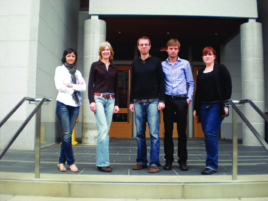Aug 29 2021
Distributed Teams Can Work After All
The 2012 paper in Science about the CRISPR/Cas9 system has been hailed as the greatest breakthrough in biology since Crick and Watson’s discovery of the DNA double helix in 1953. It has earned its two Principal Investigators (PI), Emmanuelle Charpentier and Jennifer Doudna, the 2020 Nobel prize in chemistry. Laypersons cannot really follow this paper but what we can better understand is how the research team worked. And it is remarkable.
A Distributed Team
Francis Crick and James Watson, of double-helix fame, worked in the Cavendish lab at Cambridge University and interacted in person every day, which is supposedly essential for teamwork, particularly with experiments. By contrast, the six authors of the 2012 paper were at three different locations, thousands of miles apart and across nine time zones:
- Emmanuelle Charpentier and Ines Fonfara were at Umeå University in Sweden.
- Jennifer Doudna, Martin Jinek, and Michael Hauer were at UC Berkeley in California.
- Krzysztof Chylinski was at the University of Vienna, Austria
The featured picture above shows five of the six co-authors at their one and only in-person meeting at UC Berkeley in 2012. The rest of the time, they communicated and coordinated their activities exclusively by electronic means.
In principle, distributed teams don’t work because physical separation prevents their members from bonding, and the demands of the local organizations they work for taking priority over the distributed team. As a result, the members can’t get to the point where they finish each other’s sentences and they drift apart.
How It Worked
In The Code Breaker, Walter Isaacson sheds some light on how this team worked:
- They didn’t know it couldn’t be done.
- They were all enthusiastic about this research.
- The PIs trusted each other.
- They were brilliant.
According to Isaacson, they even made the 9-hour time lag between California and Europe work in their favor by having a team that never slept. Each evening, Berkeley updated Umeå and Vienna on the experiments. The Europeans then worked while the Californians slept, and updated them in turn at the end of the European workday. The most commonly used collaboration tools of today, Zoom and Slack, didn’t exist in 2011-2012. Both came out in 2013.

August 29, 2021 @ 10:39 am
Academics are not limited as much as are those who work in for-profit commercial organizations where their bosses CAN dictate what an employee does or does not do. Academia is powered by autonomous work, flexible schedules, pressure to publish-or-perish above all else, no pressure to generate revenue with one’s work, etc.
If distributed teams could work where the work produces a physical product, then virtual cells would have been a roaring success. I doubt if that has happened. In fact, factories are built and people love to work in silo-based organizations!